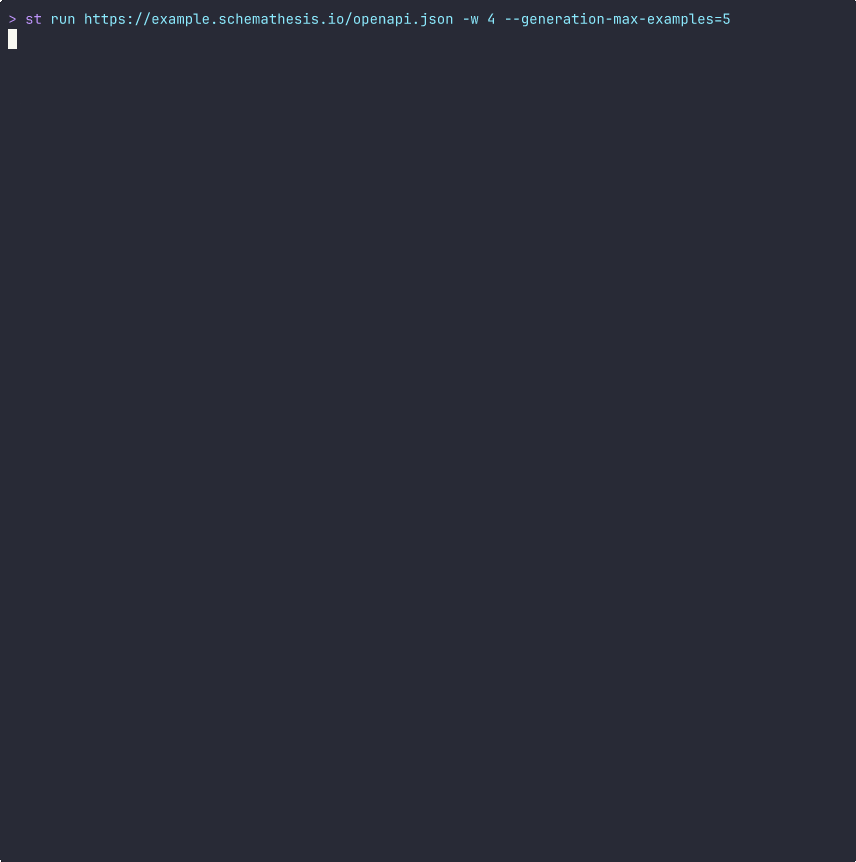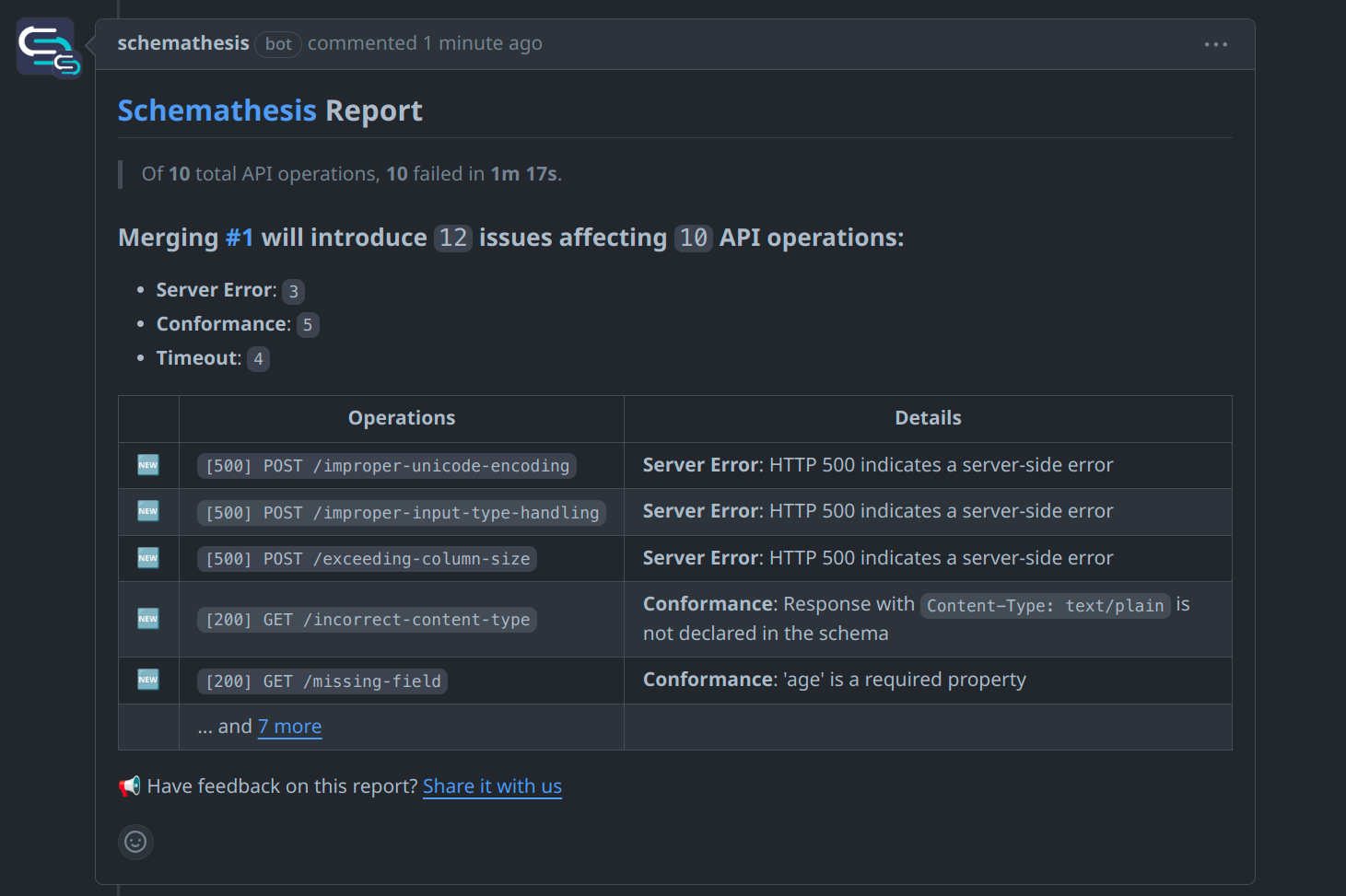Property-based testing framework for Open API and GraphQL based apps
Project description
Schemathesis: Supercharge your API testing, catch bugs, and ensure compliance
Documentation: https://schemathesis.readthedocs.io/en/stable/
Chat: https://discord.gg/R9ASRAmHnA
What is Schemathesis?
Schemathesis is a tool that levels-up your API testing by automating the process of finding crashes, uncovering bugs, and validating spec compliance. With Schemathesis, you can:
🎯 Catch Hard-to-Find Bugs
- Uncover hidden crashes and edge cases that manual testing might miss
- Identify spec violations and ensure your API adheres to its defined contract
⚡ Accelerate Testing Cycles
- Automatically generate a wide range of test cases based on your API schema
- Save time and effort by eliminating the need for manual test case creation
🧩 Integrate Seamlessly
- Works with popular API formats such as OpenAPI, GraphQL.
- Easily integrate into your existing testing pipeline and CI/CD workflows
🔧 Customize and Extend
- Tune the testing process to your specific requirements using Python extensions
- Modify and enhance various aspects of the testing flow to suit your needs with rich configuration options
📊 Gain Valuable Insights
- Get detailed reports and actionable insights to help you identify and fix issues quickly
- Reproduce failing test cases effortlessly with generated code samples and cURL commands
Quick Demo

With a summary right in your PRs:
Getting Started
Choose from multiple ways to start testing your API with Schemathesis.
💡 Your API schema can be either a URL or a local path to a JSON/YAML file.
💻 Command-Line Interface
Quick and easy for those who prefer the command line.
Python
- Install via pip:
python -m pip install schemathesis - Run tests
st run --checks all https://example.schemathesis.io/openapi.json
Docker
- Pull Docker image:
docker pull schemathesis/schemathesis:stable - Run tests
docker run schemathesis/schemathesis:stable
run --checks all https://example.schemathesis.io/openapi.json
🐍 Python Library
For more control and customization, integrate Schemathesis into your Python codebase.
- Install via pip:
python -m pip install schemathesis - Add to your tests:
import schemathesis
schema = schemathesis.from_uri("https://example.schemathesis.io/openapi.json")
@schema.parametrize()
def test_api(case):
case.call_and_validate()
💡 See a complete working example project in the /example directory.
:octocat: GitHub Integration
GitHub Actions
Run Schemathesis tests as a part of your CI/CD pipeline.
Add this YAML configuration to your GitHub Actions:
api-tests:
runs-on: ubuntu-22.04
steps:
- uses: schemathesis/action@v1
with:
schema: "https://example.schemathesis.io/openapi.json"
# OPTIONAL. Add Schemathesis.io token for pull request reports
token: ${{ secrets.SCHEMATHESIS_TOKEN }}
For more details, check out our GitHub Action repository.
💡 See our GitHub Tutorial for a step-by-step guidance.
GitHub App
Receive automatic comments in your pull requests and updates on GitHub checks status. Requires usage of our SaaS platform.
- Install the GitHub app.
- Enable in your repository settings.
Software as a Service
Schemathesis CLI integrates with Schemathesis.io to enhance bug detection by optimizing test case generation for efficiency and realism. It leverages various techniques to infer appropriate data generation strategies, provide support for uncommon media types, and adjust schemas for faster data generation. The integration also detects the web server being used to generate more targeted test data.
Schemathesis.io offers a user-friendly UI that simplifies viewing and analyzing test results. If you prefer an all-in-one solution with quick setup, we have a free tier available.
How it works
Here’s a simplified overview of how Schemathesis operates:
- Test Generation: Using the API schema to create a test generator that you can fine-tune to your testing requirements.
- Execution and Adaptation: Sending tests to the API and adapting through statistical models and heuristics to optimize subsequent cases based on responses.
- Analysis and Minimization: Checking responses to identify issues. Minimizing means simplifying failing test cases for easier debugging.
- Stateful Testing: Running multistep tests to assess API operations in both isolated and integrated scenarios.
- Reporting: Generating detailed reports with insights and cURL commands for easy issue reproduction.
Research Findings on Open-Source API Testing Tools
Our study, presented at the 44th International Conference on Software Engineering, highlighted Schemathesis's performance:
-
Defect Detection: identified a total of 755 bugs in 16 services, finding between 1.4× to 4.5× more defects than the second-best tool in each case.
-
High Reliability: consistently operates seamlessly on any project, ensuring unwavering stability and reliability.
Explore the full paper at https://ieeexplore.ieee.org/document/9793781 or pre-print at https://arxiv.org/abs/2112.10328
Testimonials
"The world needs modern, spec-based API tests, so we can deliver APIs as-designed. Schemathesis is the right tool for that job."
"Schemathesis is the only sane way to thoroughly test an API."
"The tool is absolutely amazing as it can do the negative scenario testing instead of me and much faster! Before I was doing the same tests in Postman client. But it's much slower and brings maintenance burden."
"Schemathesis is the best tool for fuzz testing of REST API on the market. We are at Red Hat use it for examining our applications in functional and integrations testing levels."
"There are different levels of usability and documentation quality among these tools which have been reported, where Schemathesis clearly stands out among the most user-friendly and industry-strength tools."
Contributing
We welcome contributions in code and are especially interested in learning about your use cases. Understanding how you use Schemathesis helps us extend its capabilities to better meet your needs.
Feel free to discuss ideas and questions through GitHub issues or on our Discord channel. For more details on how to contribute, see our contributing guidelines.
Let's make it better together 🤝
Your feedback is essential for improving Schemathesis. By sharing your thoughts, you help us develop features that meet your needs and expedite bug fixes.
- Why Give Feedback: Your input directly influences future updates, making the tool more effective for you.
- How to Provide Feedback: Use this form to share your experience.
- Data Privacy: We value your privacy. All data is kept confidential and may be used in anonymized form to improve our test suite and documentation.
Thank you for contributing to making Schemathesis better! 👍
Commercial support
If you're a large enterprise or startup seeking specialized assistance, we offer commercial support to help you integrate Schemathesis effectively into your workflows. This includes:
- Quicker response time for your queries.
- Direct consultation to work closely with your API specification, optimizing the Schemathesis setup for your specific needs.
To discuss a custom support arrangement that best suits your organization, please contact our support team at support@schemathesis.io.
Acknowledgements
Schemathesis is built on top of Hypothesis, a powerful property-based testing library for Python.
Who's Using Schemathesis?
Schemathesis is used by a number of project and companies, including direct usage or integration into other tools:
- Abstract Machines (Magistrala)
- Bundesstelle für Open Data (smard-api)
- CheckMK
- HXSecurity (DongTai)
- Netflix (Dispatch)
- Pixie
- Qdrant
- Spotify (Backstage)
- WordPress (OpenVerse)
Additional content
Papers
- Deriving Semantics-Aware Fuzzers from Web API Schemas by @Zac-HD and @Stranger6667
- Description: Explores the automation of API testing through semantics-aware fuzzing. Presented at ICSE 2022.
- Date: 20 Dec 2021
Articles
-
Implementing Schemathesis at PayLead by Jérémy Pelletier at PayLead
- Description: In-depth walkthrough including custom hooks, stateful testing and CI/CD integration.
- Date: 29 May 2024
-
Auto-Generating & Validating OpenAPI Docs in Rust: A Streamlined Approach with Utoipa and Schemathesis by identeco
- Description: Demonstrates OpenAPI doc generation with Utoipa and validating it with Schemathesis.
- Date: 01 Jun 2023
-
Testing APIFlask with schemathesis by @pamelafox
- Description: Explains how to test APIFlask applications using Schemathesis.
- Date: 27 Feb 2023
-
Using Hypothesis and Schemathesis to Test FastAPI by @amalshaji
- Description: Discusses property-based testing in FastAPI with Hypothesis and Schemathesis.
- Date: 06 Sep 2022
-
How to use Schemathesis to test Flask API in GitHub Actions by @lina-is-here
- Description: Guides you through setting up Schemathesis with Flask API in GitHub Actions.
- Date: 04 Aug 2022
-
Using API schemas for property-based testing (RUS) about Schemathesis by @Stranger6667
- Description: Covers the usage of Schemathesis for property-based API testing.
- Date: 07 Sep 2021
-
Schemathesis: property-based testing for API schemas by @Stranger6667
- Description: Introduces property-based testing for OpenAPI schemas using Schemathesis.
- Date: 26 Nov 2019
Videos
- API Fuzzing: What it is and why you should use it by José Haro Peralta
- Description: A comprehensive overview and demo of Schemathesis.
- Date: 14 Feb 2023
- Schemathesis tutorial with an accompanying video by Red Hat
- Description: Provides a hands-on tutorial for API testing with Schemathesis.
- Date: 09 Feb 2023
- Effective API schemas testing from DevConf.cz by @Stranger6667
- Description: Talks about using Schemathesis for property-based API schema testing.
- Date: 24 Mar 2021
- API-schema-based testing with schemathesis from EuroPython 2020 by @hultner
- Description: Introduces property-based API testing with Schemathesis.
- Date: 23 Jul 2020
License
This project is licensed under the terms of the MIT license.
Project details
Release history Release notifications | RSS feed
Download files
Download the file for your platform. If you're not sure which to choose, learn more about installing packages.
Source Distribution
Built Distribution
File details
Details for the file schemathesis-3.29.0.tar.gz.
File metadata
- Download URL: schemathesis-3.29.0.tar.gz
- Upload date:
- Size: 57.9 MB
- Tags: Source
- Uploaded using Trusted Publishing? No
- Uploaded via: twine/5.0.0 CPython/3.12.3
File hashes
| Algorithm | Hash digest | |
|---|---|---|
| SHA256 | a36fc7eddb90978a5afaf3b87978a7f4387ca81088fd995b9a2c79c5470b3e75 |
|
| MD5 | b956615c873c3113eb4c71248eec7334 |
|
| BLAKE2b-256 | b3b24394a0350575b606500291bc3dd3b1ca7792d54dd708517f99e698199f8c |
File details
Details for the file schemathesis-3.29.0-py3-none-any.whl.
File metadata
- Download URL: schemathesis-3.29.0-py3-none-any.whl
- Upload date:
- Size: 275.6 kB
- Tags: Python 3
- Uploaded using Trusted Publishing? No
- Uploaded via: twine/5.0.0 CPython/3.12.3
File hashes
| Algorithm | Hash digest | |
|---|---|---|
| SHA256 | 73e8fe10b153fb7f5eb3dde5d36dfa84620ffd5277bfeb1655e9a3bfa1d4a8b1 |
|
| MD5 | 9dca7e624598c79dcc6ecbac1ceaaa92 |
|
| BLAKE2b-256 | 37bcf0eee0d3d85e618c3297eeab106af04635d8b447824943e0e13a57e947d7 |


















